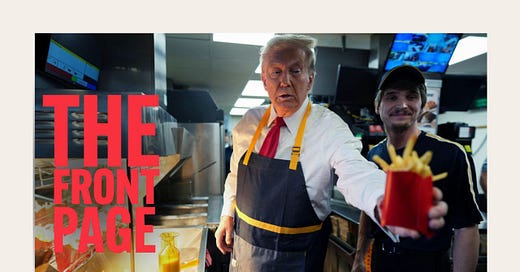
It’s Tuesday, October 22, and this is The Front Page, your daily window into the world of The Free Press—and our take on the world at large. Coming up: The billionaires bankrolling Trump and Harris. The real Hezbollah. Communist Cuba goes dark. And much more.
But first, we are two weeks out from the election, and here’s what I can’t help but notice:
The weird thing about this election is how little has changed given how much has changed.
Just think about what’s happened since May: Donald Trump was convicted in a criminal trial in New York (May 30). Trump and Joe Biden met in the most momentous presidential debate in American history (June 27). Donald Trump survived an assassination attempt by a whisker (July 13). Joe Biden announced he would not run for reelection (July 21). Kamala Harris accepted the Democratic nomination, after no one in her party challenged her (August 22). Oh, and then another gunman tried to kill Trump (September 15).
In a word: chaos.
But the polls? Oddly stable.
Yes, Biden’s numbers took a knock after the debate, and then Harris got a little honeymoon bump. But the gentle slopes of the polling charts—a percentage-point swing here and there—suggest a very different kind of year from the one we have endured. After all the ups and downs, we find ourselves in a very familiar place: another nail-biter of a race.
Meanwhile, we are said to be living through a seismic political realignment. Non-college-educated voters are flocking to the Republicans and college-educated voters are becoming a reliably Democratic bloc. Latinos have moved right. The Democrats are losing their hold on black voters. Women are turning blue. Men are turning red.
Where do these once-in-a-generation shifts, with millions of voters marching leftward and rightward, leave us?
More deadlock!
If our perennial 50-50 politics feels weird, that’s because it is weird. That’s what Ruy Teixeira and Yuval Levin argue in a new AEI report, Politics Without Winners: Can Either Party Build a Majority Coalition?
“Stalemate is not the American party system’s natural equilibrium,” say conservative Levin and liberal Teixeira. Both parties, they argue, have waxed and waned over time: The coalition built during the New Deal era set up decades of Democratic dominance; the Republicans dominated in the 1970s and ’80s. But today, no party seems able to build the necessary coalition for an enduring majority.
“What the Republican and Democratic coalitions have in common is enough strength to stalemate the other party but not enough to dominate,” write Levin and Teixeira. “As a result, a noxious back-and-forth has defined American politics for a generation.”
The only thing stopping the parties transforming themselves from minority to majority parties is themselves, Levin and Teixeira conclude. Both parties, they argue, “have prioritized the wishes of their most intensely devoted voters—who would never vote for the other party—over the priorities of winnable voters who could go either way.”
In short, rather than trying to build broad coalitions, “they have focused on fan service.”
Levin and Teixeira’s advice to the parties could be boiled down to three words that any frustrated independent voter has muttered to themselves recently: Just be normal!
Democrats talking about “Latinx” voters? Just be normal!
Republicans banning IVF? Just be normal!
Donald Trump calling for an encore from the “J6 prison choir”? Just be normal!
Kamala Harris supporting taxpayer-funded gender realignment surgery for detained migrants?
Just. Be. Normal.
You might think this would be obvious, and yet somehow the parties fail to learn their lesson. Instead they overinterpret their narrow wins, under-interpret their narrow losses, and squander opportunities to grow their coalition.
Just look at 2020, when Joe Biden campaigned with a narrow anti-Trump message but then governed as if the country had just voted for the Green New Deal and an open border. Meanwhile, Trump didn’t just under-interpret his defeat—he denied it altogether.
Whoever wins in two weeks, the party that stands the best chance of breaking out of the stalemate is the one who listens to the message from the voters: Just be normal. And get serious about building an enduring coalition.
The Billionaires Trying to Swing the Election
Over the weekend Elon Musk handed million-dollar checks to two voters in Pennsylvania, and announced that he planned to hand out one a day between now and Election Day to people who sign his online petition in support of the First and Second Amendments.
Pennsylvania governor Josh Shapiro has called the stunt “deeply concerning” and said “it’s something that law enforcement could take a look at.”
Legal or not, the scheme is a gauche reminder of how profoundly a small handful of billionaires are influencing this year’s elections.
Both parties are in on it, of course. And, according to the latest numbers, Kamala Harris is better than Donald Trump at persuading wealthy supporters to cut a check. Harris raised $1 billion in the three-month period that ended September 30, according to data released by her campaign Sunday. That’s the biggest political fundraising quarter in American history. Last month alone, the Harris campaign and its affiliated PACs raised $378 million, compared to $160 million for Trump.
But who are the wealthy Harris backers? That’s the subject of Gabe Kaminsky’s piece for the Washington Examiner, which we’re reprinting today.
Who Are Hezbollah?
In the past year, protesters have marched through Western cities chanting things like “I love Hezbollah,” and waving the flag of the Iran-backed terror group. When a group responsible for the murder of hundreds of Americans is being praised on the streets of New York, something has gone horribly wrong. Today on Honestly, Michael Moynihan sits down with three people who understand Hezbollah’s true nature: a totalitarian force in Lebanon, an occupying force in Syria, the perpetrators of narco-terrorism and sex slavery, and the foot soldiers of Iran’s imperial project in the Middle East. Click the play button below, or listen to their discussion wherever you get your podcasts.
Both Donald Trump and Kamala Harris have vowed to “protect Social Security,” but the nonpartisan Committee for a Responsible Federal Budget finds that “neither candidate has presented plans to fix Social Security’s finances” despite the fact that it is on track to be insolvent by 2034. The CRFB finds that Trump’s proposals would make things dramatically worse, bringing insolvency forward to 2031.
One in five Republicans say that if Trump loses next month, he should declare the results invalid and do whatever it takes to assume office. The number is higher than the figure for Democrats—around one in ten Democratic supporters say Harris should do the same if she loses. Now maybe I’m an optimist, but given all the fretting about MAGA supporters brainwashed by “The Big Lie,” this seems like a reassuringly low number.
Loretta Lynch, who served as attorney general in the Obama administration, is working for a Chinese drone manufacturer. Lynch has also filed a lawsuit for DJI, a U.S.-designated Chinese military firm, against the Pentagon—arguing that DJI’s Chinese military designation is illegal. National Review reports that U.S. officials have “long warned” that the “drone manufacturer is tied to China’s defense-industrial complex” and that “the Chinese authorities have used DJI products in their mass surveillance of Uyghurs.” File Lynch’s latest gig under: things that should definitely be illegal if they’re not already illegal.
From mercenary public officials to patriotic private-sector workers: The Defense Department is considering asking senior Silicon Valley professionals to join the reserves. DOD’s chief talent management officer Brynt Parmeter told The Wall Street Journal that the agency is creating “this people industrial base” that will help “solve our national-security problems and national-security challenges in the decades to come.” This idea? Good. Phrases like “people industrial base”? Bad.
The price of gold has hit an all-time high as investors flock to this old-fashioned safe haven amid growing global turmoil. Gold is up 32 percent since the start of the year, and Trump isn’t sure whether to point to this as evidence of the failures of the Biden-Harris administration or a chance to sell a few more Trump coins. Read Suzy Weiss on “The Great Gold Rush of 2024.”
Cubans battled another night of a nationwide blackout Monday after the collapse of the country’s electrical grid. To make matters worse, Hurricane Oscar hit the island with wind and heavy rain. The failure of communism in Cuba is so obvious you can now see it from space. As Cuba’s economy crumbles, Cuban officials recently asked China for advice and support. The Financial Times reports that Beijing advised the Cuban regime to implement market-oriented reforms, but were left “perplexed and frustrated” by their unwillingness to do so.
CBS Refuses to Release the Harris Transcript
A little over a week ago, we published an editorial calling on 60 Minutes to release a full, unedited transcript of its controversial recent interview with Kamala Harris. After CBS published two clips from the interview with Harris giving two completely different answers to the same question, it appeared the show had misled its viewers, editing the interview to present the Democratic presidential candidate in a more flattering light. With CBS’s journalistic standards being called into question, the network could easily clear things up by showing us the unedited version of the interview. Instead, 60 Minutes did nothing. Then, on Sunday night, the show issued a curt statement in which they stonewalled even further.
“60 Minutes gave an excerpt of our interview to Face the Nation that used a longer section of her answer than that on 60 Minutes,” it read. “Same question. Same answer. But a different portion of the response.” Except, from the viewers’ point of view, it was a completely different answer.
After refusing to engage with anyone asking perfectly reasonable questions about their editing decisions, 60 Minutes now says the portion of her answer on the prime time show was “more succinct, which allows time for other subjects in a wide ranging 21-minute-long segment.” But the more succinct answer was also a far better answer from the vice president’s point of view. (Watch and judge for yourself.) Plus, if time is the real consideration, why not put the unedited version online, where there is no such pressure? Sunlight is always the best disinfectant. That was true the day after the show aired. And it’s true now.
Oliver Wiseman is a writer and editor for The Free Press. Follow him on X @ollywiseman.
To support The Free Press, become a paid subscriber today:










North Carolina? Anyone? OK, well, my church will now be housing and feeding a rotating crew of young men for at least the next year. These guys go out and find people in need of tree cutting and removal, home repair, land restoration. They do this with no cost to the victims or taxpayers. They come from all over the country. The needs have evolved to tents, sleeping bags and lanterns.
Meanwhile, FEMA has set up locations and tables with laptops where victims, if they can get there, can fill out some forms. And wait.
“Non-college-educated voters are flocking to the Republicans and college-educated voters are becoming a reliably Democratic bloc.”
————————————————————-
Please refer to them as “people who attended college”. No educating is taking place at those godforsaken communist flea markets.